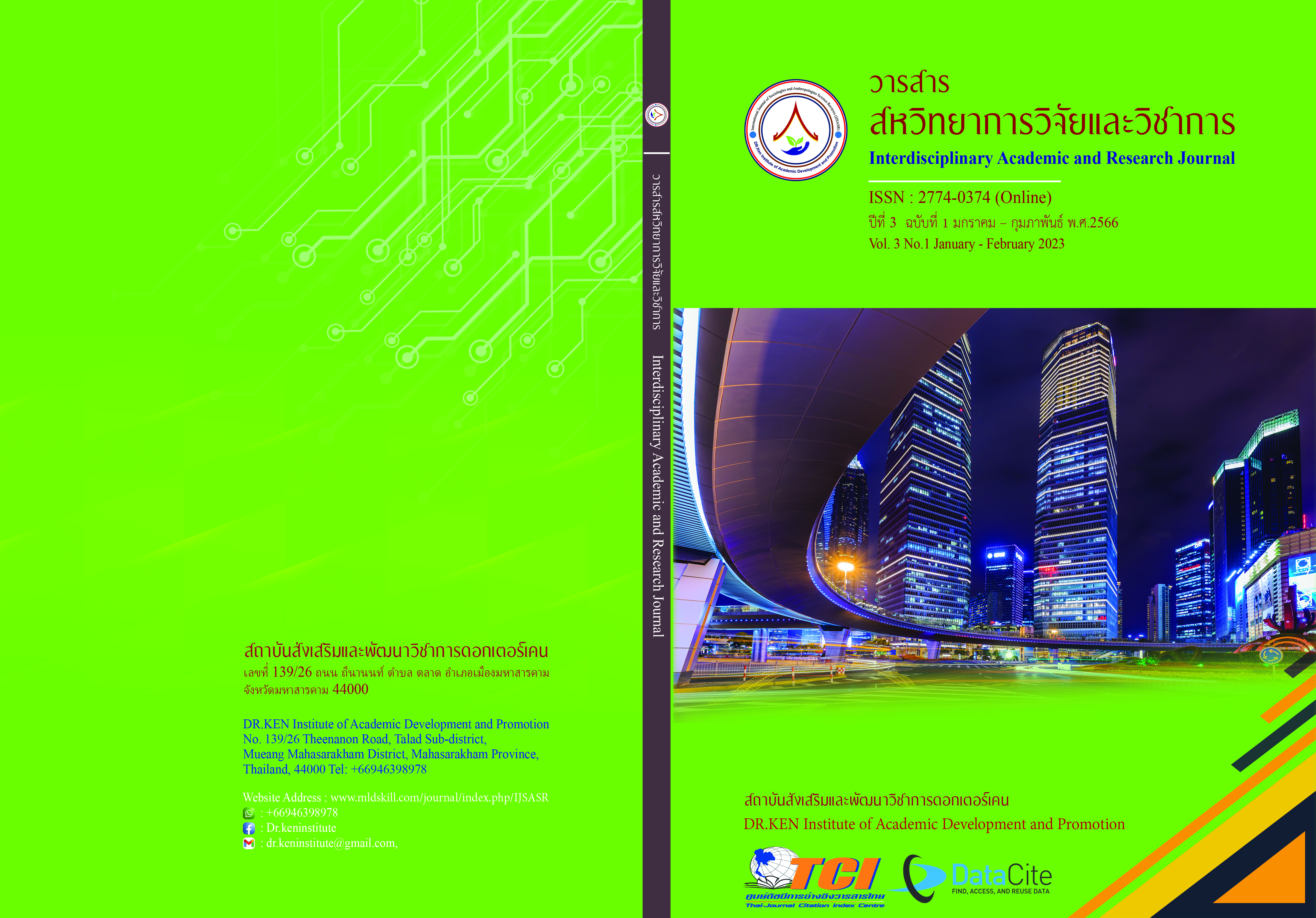Administrative Skills in the 21st Century of School Administrators under Vocational Education, Chachoengsao Province
DOI:
https://doi.org/10.14456/iarj.2023.47Keywords:
Management Skills in the 21st Century; , Attitude; , The Educational Administrators in Vocational Education instituteAbstract
Nowadays, it is a society of change and a society of continuous learning, school administrators and executives of various departments cannot stop developing themselves but must learn continuously to prepare themselves. and their organizations to cope with changes over time and quickly. School administrators must have administrative skills, academic leadership, knowledge, and professionalism to be effective leaders and effective management for organizational development. Thus, the purpose of this research is (1) To study administrative skills in the 21st century of school administrators under vocational education in Chachoengsao Province. And (2) to compare the level of opinions towards management skills in the 21st century of school administrators under vocational education in Chachoengsao Province classified by gender, work experience, and teaching level. The population in this research consisted of 569 vocational educational institutes in Chachoengsao Province using a sample of 229 people. The research tool was the questionnaire on management skills in the 21st century. The statistics used in the research were frequency, mean, percentage, standard deviation, F-test, and t-test. The results showed that (1) management skills in the 21st century of school administrators under vocational education in Chachoengsao Province were generally at a high level. And (2) the results of a comparative analysis of opinions on the management skills in the 21st century of vocational education institute administrators in Chachoengsao Province, both overall and in terms found that; (a) classified by gender, the overall difference was statistically significant at the .05 level, while the individual differences were in terms of communication skills. (b) Classified by work experience in general, there is no difference, but in terms of creative skills. And (c) Classified by the teaching level as a whole and each aspect was not different.
References
กรรณิกา เรดมอนด์. (2559). ทักษะการบริหารงานในศตวรรษที่ 21. กรุงเทพฯ : สำนักพิมพ์บรรณกิจ.
ฐนพร จันทร์มั่น. (2564). ทักษะภาวะผู้นำในศตวรรษที่ 21 ของผู้บริหารสถานศึกษาส่งผลต่อการบริหารงานวิชาการของโรงเรียนมัธยมศึกษาของรัฐ จังหวัดสุพรรณบุรี. วารสารสิรินธรปริทรรศน์, 22(2),205-218.
นริศสรา บุญสะอาด. (2564). ทักษะในศตวรรษที่21 ที่ส่งผลต่อภาวะผู้นำทางวิชาการของผู้บริหารสถานศึกษาสังกัดสำนักงานเขตพื้นที่การศึกษาประถมศึกษาสมุทรสาคร. วิทยานิพนธ์การศึกษามหาบัณฑิต (การบริหารการศึกษา), บัณฑิตวิทยาลัย มหาวิทยาลัยศิลปากร.
บุญชม ศรีสะอาด. (2553). การวิจัยเบื้องต้น. กรุงเทพฯ : สุวีริยาสาส์น.
พรพิมล แก้วอุทัศน์. (2564). ทักษะการบริหารในศตวรรษที่ 21 ของผู้บริหารสถานศึกษาสังกัดสำนักงานเขตพื้นที่การศึกษาประถมศึกษาบุรีรัมย์ เขต 3 ตามทัศนะของครู. วารสารวิชาการคณะมนุษยศาสตร์และสังคมศาสตร์, 12(1),111-126.
พิมพ์พร จารุจิตร์. (2559). ภาวะผู้นำกับการบริหารสถานศึกษาในศตวรรษที่ 21. วิทยานิพนธ์ กศ.ด. (การบริหารและพัฒนาการศึกษา), คณะครุศาสตร์ มหาวิทยาลัยราชภัฏอุดรธานี.
วราพร บุญมี. (2563). ทักษะการบริหารในศตวรรษที่ 21 ของผู้บริหารสถานศึกษาโรงเรียนมัธยมศึกษาจังหวัดอุตรดิตถ์. วารสารมหาจุฬานาครทรรศน์, 7(5), 172-182.
สมคิด นาคขวัญ. (2561). ทักษะการบริหารงานในศตวรรษที่ 21 ของผู้บริหารสถานศึกษา ตามการรับรู้ของครูสังกัดสำนักงานเขตพื้นที่การศึกษาประถมศึกษาสุราษฎร์ธานี เขต 2. ครุศาสตรมหาบัณฑิต สาขาวิชาการบริหารการศึกษา. มหาวิทยาลัยราชภัฎสุราษฎร์ธานี.
สำนักงานศึกษาธิการจังหวัดฉะเชิงเทรา. (2565). ข้อมูลบุคลากรในสถานศึกษาในสังกัดอาชีวศึกษา จังหวัดฉะเชิงเทรา. สำนักงานศึกษาธิการจังหวัดฉะเชิงเทรา.
ฮิวจ์ เดลานี. (2562). การศึกษาสำหรับศตวรรษที่ 21 การพัฒนาทักษะคือหัวใจสำคัญของการศึกษา. Retrieved from: https://www.unicef.org/thailand/th/stories/การศึกษาสำหรับศตวรรษที่-21.
Krejcie, R. V. & Morgan, D. W. (1970). Determining Sample Size for Research Activities. Educational and Psychological Measurement, 30(3), 607-610.
Downloads
Published
How to Cite
Issue
Section
License
Copyright (c) 2023 ปริฉัตร์ เกิดสวัสดิ์

This work is licensed under a Creative Commons Attribution-NonCommercial-NoDerivatives 4.0 International License.
Copyright on any article in the Interdisciplinary Academic and Research Journal is retained by the author(s) under the under the Creative Commons Attribution-NonCommercial-NoDerivatives 4.0 International License. Permission to use text, content, images, etc. of publication. Any user to read, download, copy, distribute, print, search, or link to the full texts of articles, crawl them for indexing, pass them as data to software, or use them for any other lawful purpose. But do not use it for commercial use or with the intent to benefit any business.
















.png)


